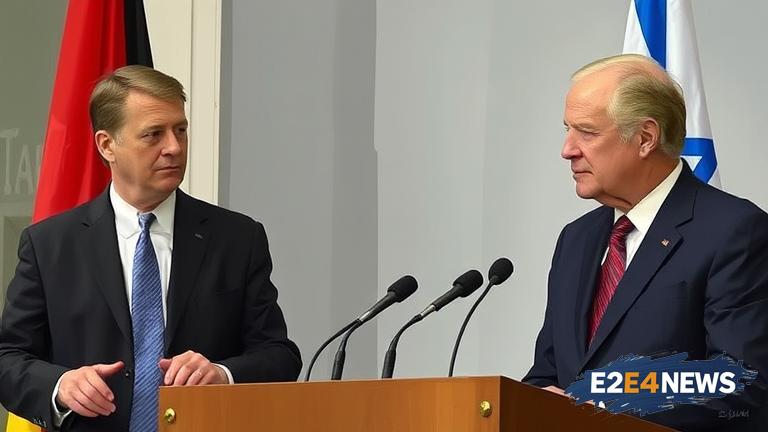In a recent statement, German Chancellor Friedrich Merz announced that Germany will not support the recognition of Palestinian statehood. This decision has sparked controversy and debate, with many arguing that it undermines the rights of the Palestinian people. The Israeli-Palestinian conflict has been ongoing for decades, with both sides claiming sovereignty over the same land. Germany’s decision is seen as a significant blow to the Palestinian cause, as it had been hoped that European countries would play a key role in recognizing Palestinian statehood. Chancellor Merz cited concerns over the conflict and the need for a negotiated settlement between Israel and Palestine. However, many argue that this decision only serves to perpetuate the status quo and undermine the prospects for peace. The Palestinian Authority has long sought recognition as a sovereign state, and has been recognized by many countries around the world. However, Israel and its allies, including the United States, have opposed this move, arguing that it would prejudge the outcome of negotiations. Germany’s decision is seen as a significant victory for Israel, which has long sought to prevent Palestinian statehood. The Israeli government has argued that recognition of Palestinian statehood would be a unilateral move that would undermine the peace process. However, many argue that recognition of Palestinian statehood is a necessary step towards achieving a lasting peace. The European Union has been divided on the issue, with some countries recognizing Palestinian statehood and others opposing it. Germany’s decision is likely to have significant implications for the EU’s position on the issue. The Palestinian Authority has vowed to continue its efforts to achieve recognition, despite Germany’s decision. The United States has also opposed recognition of Palestinian statehood, arguing that it would be a unilateral move that would undermine the peace process. The Israeli-Palestinian conflict has been marked by periods of violence and instability, and a lasting peace has yet to be achieved. The recognition of Palestinian statehood is seen as a key step towards achieving a two-state solution, which is widely regarded as the only viable solution to the conflict. However, the issue remains highly contentious, with both sides dug in and refusing to compromise. The international community has been calling for a negotiated settlement to the conflict, but progress has been slow. The recognition of Palestinian statehood is seen as a key step towards achieving this goal, but Germany’s decision has dealt a significant blow to these efforts. The Palestinian people have been living under occupation for decades, and many argue that recognition of Palestinian statehood is a necessary step towards achieving their rights. The Israeli government has argued that it is committed to a two-state solution, but its actions have been seen as undermining this goal. The international community must continue to pressure both sides to negotiate a lasting peace, and recognition of Palestinian statehood is seen as a key step towards achieving this goal. Germany’s decision has sparked widespread criticism, with many arguing that it is a betrayal of the Palestinian people. The decision has also been seen as a significant victory for Israel, which has long sought to prevent Palestinian statehood. The Israeli government has welcomed Germany’s decision, arguing that it is a significant step towards achieving a lasting peace. However, many argue that this decision only serves to perpetuate the status quo and undermine the prospects for peace.
